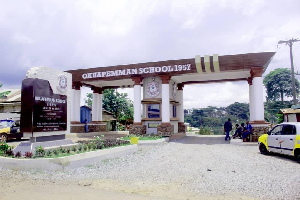- Home - News
- TWI News | TV
- Polls
- Year In Review
- News Archive
- Crime & Punishment
- Politics
- Regional
- Editorial
- Health
- Ghanaians Abroad
- Tabloid
- Africa
- Religion
- Election 2020
- Coronavirus
- News Videos | TV
- Photo Archives
- News Headlines
- Press Release
General News of Tuesday, 1 November 2011
Source: Capitaline and Ghana Daily
WAMI’s Lies Exposed
…Their press release opens more rotten worms
The decision by
the West African Monetary Institute (WAMI) to take a swipe at Capitaline and Ghana
Daily in a press release dated October 7, 2011 under the caption
“Malicious Publications Against WAMI” is proving zilch as more stinking deals
emerge.
According to the release, theintent and purposes of the said articles was
“to cause mischief through misrepresentations and misinformation”.
Capitalineand Ghana
Daily wish to state emphatically that those publications were not
intended to cause any mischief through misrepresentations and misinformation but
rather to reveal the true nature of pillage, corruption and maladministration
at WAMI.
It is instructive to note that all the
information provided in those publications provided background for scrutiny on
activities of WAMI as called for by Dr., Lounceny NABE, central bank governor
of Guinea on October 13, 2011 after the two newspapers had exposed the rot at
WAMI. That is why WAMI is currently facing probe from Guinea and we shall not
relent on our quest to expose wrongdoing and any attempt to cover up the rot
currently engulfing the institute.
In an attempt by WAMI to justify its stance and
rubbish the publications, it said:
1. “All contracts were awarded in accordance with
procurement processes of WAMI and directives of the country, bilateral
institution of multilateral institution providing the funding”.
Response:
Capitaline and Ghana Daily can say with no abstruseness that WAMI has no laid
down procedure regarding award of contracts and procurement. In the said award
of consultancy jobs that appeared in the Capitaline and Ghana Daily titled:
‘CORRUPT DEALS AT WAMI … Tender procedures thrown to the dogs’, WAMI never
followed any normal procedure of bidding process where jobs are advertised for
interested persons and entities could apply if they so wish.
So,
WAMI never published an invitation to tender for interested parties to apply
for. WAMI cannot make available a single publication in the world which showed
that it advertised those consultancy jobs. What has been the case, as admitted
by WAMI in its press release is that procurement procedures are tied to the
apron-string of a so-called granting institution arranging finance. So where
lies the due process when a company from Nigeria hiding under the guise of
giving finance, directs dictatorially that a particular contract should be
given to a particular individual instead of a competitive bidding?
2. (A)
WAMI said in “one article raised an issue in respect of a book, ‘Monetary and
financial integration in Africa’. It continued that “contrary to the article
that there was no meeting to discuss the publication of the book, the decision
to publish the book in its present form was taken at the 45th meeting of the
Management Board of WAMI on Wednesday, 28th October,
2009, in which directors of the institute were present”.
(B) Again,
contrary to the article that the directors were not acknowledged, 23
professional staff including all directors of WAMI co-authored chapters in the
edited book. As acknowledged in the preface to the book, “The book would not
have been possible without contributions of several people. It is a product of
collaborative efforts among the staff of the West African Monetary institute,
which has been at the centre of making the technical preparations for monetary
union and financial integration in the West African Monetary Zone.”
Response: (A) Our investigations
reveal that the 45th meeting of the Management Board of WAMI on
Wednesday, 28th October, 2009 that the WAMI statement referred to as
the meeting that took decision to publish the book ‘Monetary and financial
integration in Africa’ was not true. Rather, the discussion on the meeting was
to put together all the institutes’ research work and publish them as study
materials. There was nowhere management of WAMI discussed publishing the book
‘Monetary and financial integration in Africa’ with payment of royalties to
WAMI.
(B) Yes, all
the staff of WAMI who worked on the research were acknowledged. The question is
how were they acknowledged? They were just mentioned as contributors. They were
not acknowledged as staff of WAMI and there is nowhere in the book that
acknowledged WAMI after WAMI staff and resources both financial and other
materials had been used to put together all the ingredients of ‘Monetary and
financial integration in Africa’.
3. WAMI said in the statement that another
article refers to the termination of employment of certain former members of
staff. It explained that in the “case of
one of the staff, the decision not to renew his contract was taken solely on
the basis of his record of indiscipline: over a four-year period, the staff
received eight (8) written warnings and several verbal warning from four
different directors under three different Directors-General”.
The statement
continued: “In the case of a former Director, the decision not to renew her
contract was taken by the committee of Governors before a new Director General
took office. In respect of another Director mentioned in the article, he
resigned to return to a better-paying position in his home country. One of the
articles states that a Director received two cars for free from WAMI. This is
incorrect. There is a policy in place approved by the Governing Council for the
allocation and disposal of cars”.
Response: In the
case of a staff which the statement said his contract was not renewed solely on
the basis of his record of indiscipline was not true. The said man from the
Bank of Ghana was on secondment. How then could WAMI say they will not renew
his contract? The man was not on contract, period! Those who want to continue
deceiving West Africans, key stakeholders for the success of the currency, ECO,
should continue. Only time will tell.
Your
authoritativeCapitaline will give you all the gory details that led to the
man in question being forcefully barred from working with WAMI.
The WAMI
statement further noted that “one other article suggests the management of WAMI
has been intimidating staff”. It said
“his is for from the truth. Rather the management of WAMI has sought to
institute deforms and implement rules and regulations to curb indiscipline and
laxity, and to promote values normally attribute d to an international
organization”.
Next week, Capitaline and Ghana Daily will provide readers an
example of a horrible incident by WAMI which has sent shivers down the spine of
entire workers.










